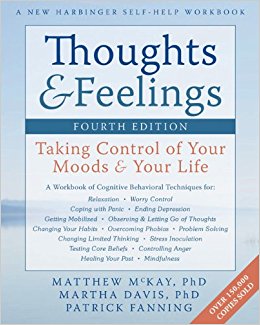Thoughts & Feelings Summary

5 min read ⌚
 Taking Control of Your Moods & Your Life
Taking Control of Your Moods & Your Life
To see beyond the shallow limitations of one’s mind was always considered the only life-mission.
The same passion is transformed into factual reality by the psychologists in recent history.
Who Should Read “Thoughts & Feelings”? And Why?
Thoughts & Feelings is a pretty straightforward, easy to digest, psychological thriller in a written form. Even if you don’t feel suffocated by your mind, you ought to investigate your thoughts.
Without slowing down, we go full steam ahead prescribe this amazing masterpiece mostly to people, who experience the early signs of depression.
About Matthew McKay, Martha Davis & Patrick Fanning
 Matthew McKay, Ph.D., is the author of several self-help books that focus on psychology. Currently, he teaches at a psychology school located in Berkeley.
Matthew McKay, Ph.D., is the author of several self-help books that focus on psychology. Currently, he teaches at a psychology school located in Berkeley.
 Martha Davis, Ph.D., shares the same eagerness as Matthew for studying the human mind.
Martha Davis, Ph.D., shares the same eagerness as Matthew for studying the human mind.
Patrick Fanning is a passionate writer, who co-authored a few other self-help books.
“Thoughts & Feelings Summary”
Even though a journey of 1000 miles starts with the first step, most of the adventures begin in our heads. The real struggle occurs when someone’s mindset is targeted for modification. If you have the right set of skills, followed by creativity, then perhaps you earned your membership!
First and foremost, what resources do you possess for such endeavors?
In order to burst that bubble, you must not shorten the time allocated to the management of resources. These assets are both tangible and fictional, often described as sensations in one’s mind.
Matthew McKay, Martha Davis, and Patrick Fanning thrive on opportunities and offer a comprehensive life-manual, on the effect of cognitive behavioral therapy (CBT). Such “strong arm” is capable of taking the entire mental sickness single-handedly.
Are you always worried, do you feel like anxiety is taking over? Are you afraid all the time?
How about we take it from the top. How often do you explode or ignite when things don’t go the way you imagined? Are short-tempered? All of these signs are a clear indicator that you are a perfect candidate to test the CBT. In general, childhood is the backbone for occurrence or avoidance of such unpleasant issues.
Before we unveil the typical types of troubled mind, let’s go deep. Do you know that thoughts, emotions and other phenomena appear automatically, meaning that there is no thinker of thoughts as you assumed?!
You cannot escape the egoistic-consciousness, what you can do, is expand your horizons and eradicate the harmful ones. If you plan on to fight, you’ll be beaten by the brick wall of thoughts.
What is the first rule of battle? Put yourself in your enemy’s head, and get the big picture. The eight standards of limited thinking are just as good as any other element or cure. Understanding the nature of your disorder can give you the upper hand and the inner edge to come out victorious.
- “Filtering” – The world is one big playground, in which we all play our part. The way you perceive it or interpret your surroundings is clarified through filtering. Your current state reflects your decision-making. A shift in focus is enough to overcome such overwhelming inner force.
- “Polarized thinking” – Your mindset is practically at the mercy of contrast. It is either good or bad, black or white. Implement likelihood, or percentages to handle this.
- “Overgeneralization” – A good example would be dating. If you had a bad time with a blonde-girl, deciding never to date blonds, is a good illustration of what this term refers to. Instead: go for the trouble itself, don’t be superstitious.
- “Mind reading” – You secretly admire your ability to read other people’s minds – a self-endangering mentality that can produce nothing but rash conclusions. Take your time, don’t judge too quickly.
- “Catastrophizing” – Drama-queen means, transforming every tiny problem into a total catastrophe. Your whining affects anyone near you – think about that. Instead: On second thought, you can adopt a logical attitude towards pressing matters.
- “Magnifying” – Your mindset defines the magnitude of your troubles. Similar to the last one, don’t request a surgery for a small cut. Simple as that.
- “Personalization” – Competitiveness is a disease of the highest order. On the other hand, no one expects from you to be the underdog, but phrases such as: “He is not as good as me” or “I can take him anytime” are contributing to unhappiness.
- “Shoulds” – Inflexibility refers to setting some simple ground rules that are not formally applicable. These are more like reactions: “We should stay late,” “Don’t do that.” “He shouldn’t do that.” Instead, you should really reconsider your behavior and avoid “dos, don’ts, shoulds, and shouldn’ts”!
Key Lessons from “Thoughts & Feelings”
1. Worrying is a choice, not a temporary state
2. Overcoming depression with a simple technique
3. A new person through CBT
Worrying is a choice, not a temporary state
Most people are overthinking stuff; they criticize themselves more than they should. Such attitude causes emotional fatigue, insomnia, and nervousness. The power of breathing can free you from such mindset.
Inhale by watching the “movement” and then slowly exhale while being aware of what’s going on.
Overcoming depression with a simple technique
Depression is consistently hindering everyone’s personal growth. A large portion of the people has no idea how to stop these terrifying attacks.
One way to do it is to reorganize your schedule, set up some goals, and ultimately break them down into subcategories.
Spice up your life with some freshness.
A new person through CBT
Once you free yourself and escape the prison of thoughts, you can indeed become the master of your mind. In general, cognition distortions are linked to all harmful sensations that cause a mental disorder. CBT is practically a cure that will relieve you from feeling guilt, aid you in panic attacks and other phobias.
Like this summary? We’d Like to invite you to download our free 12 min app, for more amazing summaries and audiobooks.
“Thoughts & Feelings” Quotes
And since the chief benefit of mindfulness comes when you refocus your mind on the here and now...mindfulness will continue to benefit you the rest of your life. Share on X People who tell you to just stop worrying don’t realize how the human mind works. Share on X When your body is completely relaxed, it’s impossible to feel fear or anxiety. Share on X Core beliefs and rules are so fundamental to personality that few people are aware of them. Share on X Thoughts cause feelings. Share on X
Our Critical Review
Emotional stress and disorder are not superficial diseases, only a team of experts can truly reach the root of the problem.
To make a long story short, this book, unlike any other, covers a niche that affects individuals from all cultures and statuses.







